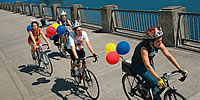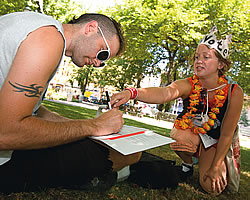 |
 |
 |
||||
 |
|
 |
|
 |
|
Bike for Democracy As voter campaigns began lighting up the Internet last year, four Oberlin alumni and a current student were plotting a different kind of project—one that favored muscles over megahertz and face-to-face dialogue over post-to-post web chat.
Their plan was straightforward: a three-month, nonpartisan bicycle trip from Portland, Oregon, to Washington, D.C., a cross-country route of 90 towns—ranging from Granville, North Dakota, (population 267) to Philadelphia and Chicago—in which the group would register and educate voters. Target populations would include youth and minorities, as well as residents in rural locales often overlooked by urban voting projects. “We needed a creative way to get young people registered,” says project coordinator Rosa Goldberg ’04, who teamed with Michael Sowiski ’03 and Brianna Cayo-Cotter ’03 to develop Bike for Democracy (BFD). Joining in was Marian Runk ’03 and Oberlin sophomore Benji Whatley, who signed on last year after attending an informational meeting on campus. Because none of the five had ever attempted such a long-distance tour, they prepared carefully, mapping out a sensible itinerary and soliciting donations of food, camping gear, hotel vouchers, and other supplies. On a clear morning in August, while cycling through Portland’s Waterfront Park, BFD registered its first voters. The crew had been headquartered in Portland for a week, attending first-aid workshops, gathering provisions, and readying their bikes. Their goal that day was to register 50 voters, the first of whom showed up before they’d even pedaled an inch. Streamers flying and balloons bobbing, the bikers then set off for a jaunt around the park. They may have looked playful, but they meant business. Within the hour, the Obies had registered 53 new voters. While social change is clearly a motivation for its members, Bike for Democracy is officially nonpartisan. “I don’t care who people vote for, I just want them out there, engaged and informed and voting,” Sowiski says. And because the young riders are part of their own target demographic, they know apathy well—and how and why to fight it. “Politics is seen as dirty or boring by young people,” Sowiski says. “I understand that—I often feel very disconnected and disempowered by the process. I feel that politicians don’t represent me; they don’t talk to my interests. But I’ve also realized that it’s crucial to synthesize electoral politics with social justice and social change.” Sowiski acquired a knack for community organizing while coordinating the America Reads literacy program in Lorain County after graduating. Goldberg’s interest in electoral politics was sparked by her work in a women’s prison in Cleveland, where she gained knowledge of voting rights and how they vary from state to state. Runk, who was raised in Dallas by Oberlin alumni parents, led a feminist reading group at the same Cleveland prison. Whatley, a student in Germany when the war in Iraq began, attended protest marches. And Cayo-Cotter, who grew up in Washington, D.C., worked in Europe for two years as an organizer for reproductive rights, economic justice, and antiwar causes. “I loved what I was doing, but I decided I could be more effective in the U.S., trying to ensure that Americans were informed and actually voting,” she says. “I felt I had a responsibility as an American citizen.” While BFD started out as an all-Oberlin project, it soon grew to include a nationwide network of contacts. This was no capricious road trip—15 riders joined in en route, and activities were customized for each town.
Halfway through the trip, the group reported remarkable success, citing a fan base that ranged from cattle ranchers and college students to senators and 16-year-olds. “It’s been more positive than any of us can imagine,” says Cayo-Cotter. “As we’re getting ready to leave a town, people are begging us to stay. They’re even giving us money along the way.” A typical day might include national radio spots, meals with community members, and, of course, registering voters. “Today we registered about 160 people,” says Whatley, checking in from a high school in Fargo, North Dakota. “Everyone wants to see more people participating in the voting process—especially young people,” adds Cayo-Cotter. “We’ve been staying at the homes of staunch Republicans, and they’re really into our project. They like us—they even make us bacon and eggs in the morning.” For more information, visit http://www.bikefordemocracy.org.
Next Page >> |

